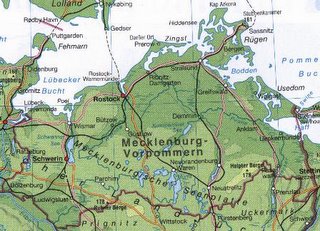Bird flu is here. React as slowly as possible
Yes indeed, bird flu is here in Germany. At this stage it has only been detected on the island of Rügen in the state of Mecklenburg-Vorpommern, in the north-east of Germany. Presumably, though, it's only a matter of time until it spreads from wild migratory birds to local birds and from them to domesticated and farmed birds. Oh joy! There's no evidence at this stage that there has been any mutation in the virus allowing it to be passed from human to human, so unless you're hanging around or touching infected birds or their carcasses, you're fine. For now.

Given the risk of infection from bird carcasses, it's being viewed as a bit of a scandal that Mecklenburg- Vorpommern seems to have been caught with its pants down on this issue. The dead birds were left lying around on beaches for days, no satisfactory attempts were made to prevent access to the area and the "rapid detection test" to see whether or not the birds in question were infected with H5N1 took, umm, six days. Rapid, my arse.
The problem seems to be that Germany is, once again, handicapped by its federal structure. The individual states, or Bundesländer, in Germany hold a lot of power and claim a lot of responsibility in certain areas. There are clear - or at times rather fuzzy - dividing lines mapping out what the individual states are responsible for, have to organize themselves, and have to pay for themselves, as opposed to what the national government is responsible for. These "areas of competence", as they are called in German, are fiercely defended and fought over tooth and nail. For reasons that are utterly beyond me, public health emergencies like this appear to fall under the responsibility of the individual states. As a result, there is no nationwide strategy in place for how to deal with bird flu now that it is here. (Go figure! I don't reckon you'd have to be a rocket scientist to understand that a disease passed on by migratory birds will not recognise or adhere to internal state borders and requires a nationwide, even Europe-wide, strategy for dealing with it effectively. But they didn't ask me for my input, oddly enough.)
Furthermore, there are evidently huge discrepancies in how well, or poorly, each of the states has prepared itself. Mecklenburg-Vorpommern, it would appear, was one of the least prepared. Of course, Sod's Law meant that that was exactly where bird flu first appeared. I predict that heads will roll over Mecklenburg-Vorpommern's poor handling of this situation. It's only a matter of time.
Der Spiegel has a good round-up of the press reaction to the bird-flu news (in English), which is worth a read.
Back to the Olympics this evening.
Tags:
bird flu, Germany, Mecklenburg-Vorpommern, health, German news











<< Home